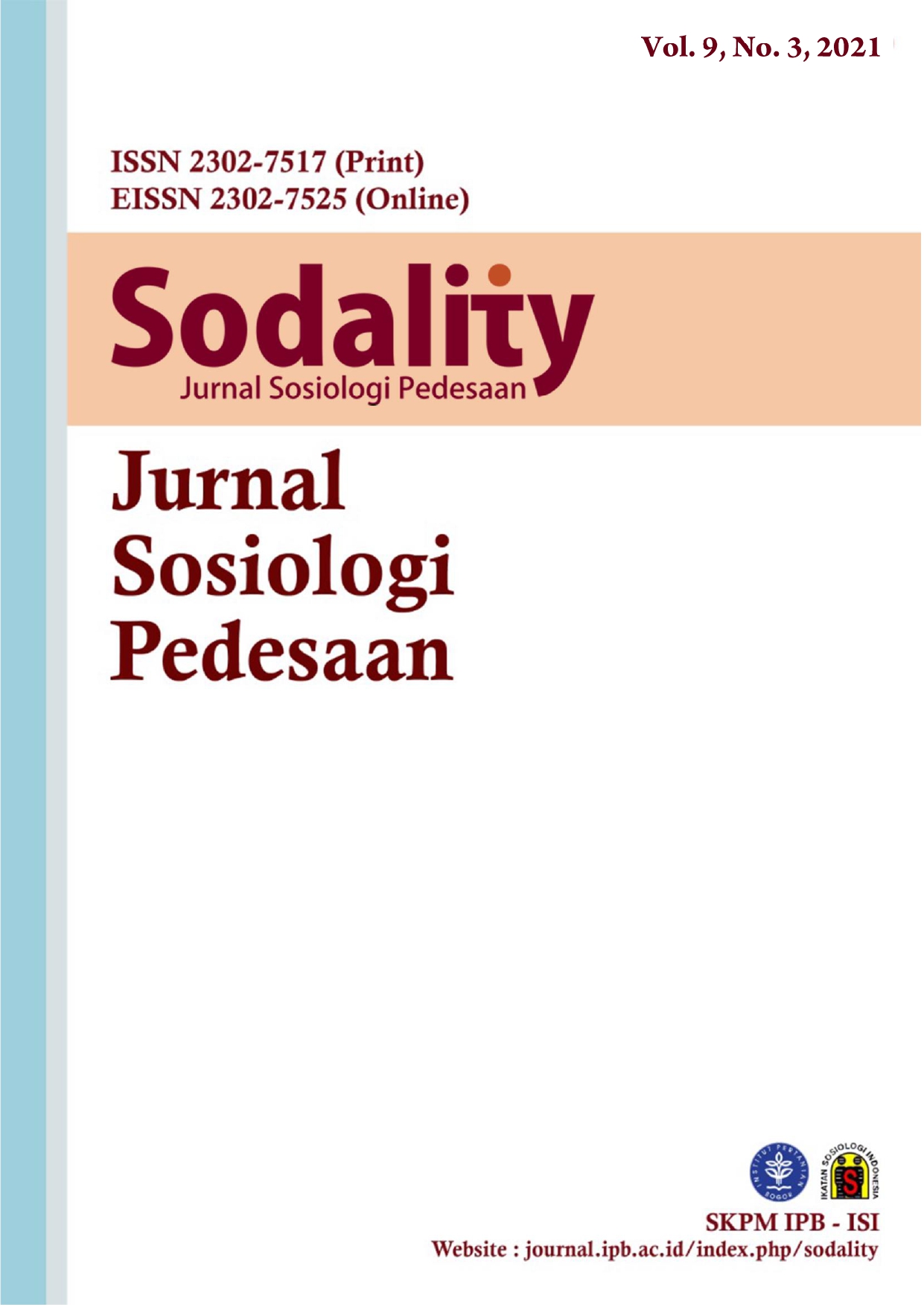Actors’ Construction in Building Social Harmony in Tamilouw, Seram Island, Maluku Province
Abstract
The Conflict in Maluku on January 19th, 1999 affected the harmony of life of the Moluccas universally. As a result, the people of Maluku live segregated in their respective communities. However, there are still groups of people who continue to live in harmony within the framework of diversity, namely the Tamilouw people on Seram-Maluku Island. The social harmony found in Tamilouw which is multi-ethnic and multi-religious is inseparable from the role of actors, and the workings of a systematic social structure. This study aimed to find out how the actors construct in the frame of diversity to achieve social harmony in the daily lives of Tamilouw people. The discipline approach used was the sociology of knowledge, using the reality construction theory of Peter Berger and Luckmann. The research paradigm used was constructivism with a qualitative approach. Key informants were religious leaders, indigenous leaders, community leaders, indigenous people and migrants. Data collection was carried out using observation, interview, and documentation techniques. The techniques of data analysis was the data flow analysis model according to Miles & Huberman. Based on the research findings, data analysis and discussion, it can be concluded that: Social harmony maintained in Tamilouw, Seram-Maluku Island, is the result of the integration of four main actors, namely religious leaders, traditional leaders, government figures and youth leaders. These four actors have a network or bond of trust, work strategies and rules of prevailing norms.
References
Berger, P. L., & Luckmann, T. (2013). Tafsir Sosial atas Kenyataan: Risalah tentang Sosiologi Pengetahuan. LP3ES.
Berry, J. W. (2011). Integration and Multiculturalism: Ways towards Social Solidarity. Papers on Social Representations, 20(1), 2.1-2.21.
Boedi, T. S. (2009). Resolusi Konflik Agama di Pulau Ambon. Jurnal Ketahanan Nasional, 14(3), 51–60.
Cinu, S. (2016). Agama, Meliterisasi dan Konflik (Kasus Posso, Sulawesi Tengah). Al-Fikra: Jurnal Ilmiah Keislaman., 15(1), 1–49.
Creswell, J. W. (2017). Research Design: Pendekatan Kualitatif, Kuantitatif, dan Mixed. Pustaka Pelajar.
Denzin, N. K., & Lincoln, Y. S. (2011). Handbook of Qualitative Research. Pustaka Pelajar.
Eriyanto. (2015). Analisis Framing: Konstruksi, Ideologi, dan Politik Media. LKiS.
Fidiyani, R. (2013). Kerukunan Umat Beragama di Indonesia (Belajar Keharmonisan dan Toleransi Umat Beragama di Desa Cikakak, Kec. Wangon, Kab. Banyumas). Jurnal Dinamika Hukum, 13(3), 468–482.
Haryanto, J. T. (2012). Interaksi dan Harmoni Umat Beragama. Walisongo: Jurnal Penelitian Sosial Keagamaan, 20(1), 211–234.
Jati, W. R. (2013). Kearifan Lokal Sebagai Resolusi Konflik Keagamaan. Walisongo: Jurnal Penelitian Sosial Keagamaan, 21(2), 393–416.
Lindawaty, D. S. (2011). Konflik Ambon: Kajian Terhadap Beberapa Akar Permasalahan dan Solusinya. Jurnal Politica: Dinamika Masalah Politik Dalam Negeri & Hubungan Internasional, 2(2), 271–297.
Lokollo, A. (2012). Integrasi Sosial dalam Masyarakat Pluralitas Agama: Tinjauan Kritis dari Perspektif Sosiologi Agama di Dusun Yalahatan, Negeri Tamilouw [Universitas Kristen Satya Wacana]. https://repository.uksw.edu/handle/123456789/2478.
Maliki, Z. (2012). Rekonstruksi Teori Sosial Modern. UGM Press.
Matakena, F. (2010). Pergeseran Nilai Pela Gandong pada Masyarakat Adat Maluku Tengah Pasca Konflik. Komunitas: International Journal of Indonesian Society and Culture, 1(1), 41.
Mishra, S., & Kumar, C. B. (2014). Undesrstanding Diversity: A Multicultural Perspective. IOSR Journal of Humanities and Sociaal Science, 19(9), 62–66.
Moirangthem, L. D. (2011). Multiculturalism and Conflict in Khushuwant Singh’s Train to Pakistan. Journal of Literature, Culture & Media Studies, 3(5–6), 103–112.
Moleong, L. J. (2017). Metodologi Penelitian Kualitatif. Remaja Rosdakarya.
Nasikun. (2011). Sistem Sosial Indonesia. CV Rajawali.
Nazir, M. (2013). Metode Penelitian. Ghalia Indonesia.
Rahawarin, Y. (2013). Kerjasama Antar Umat Beragama: Studi Rekonsiliasi Konflik Agama di Maluku dan Tual. Kalam: Jurnal Studi Agama Dan Pemikiran Islam, 7(1), 95–120.
Rosyid, M. (2017). Peredam Konflik Agama: Studi Analisis Penyelesaian di Tolikara Papua 2015. Jurnal AFKARUNA, 13(1), 48–51.
Rudiansyah, D. (2015). Dimensi Sosio-Politik Konflik Ambon. Jurnal Sosiologi Reflektif, 10(1), 161–174.
Safi, J. (2017). Konflik Komunal: Maluku 1999-2000. ISTORIA: Jurnal Pendidikan Dan Sejarah, 13(1), 33–44.
Salim, A. (2001). Teori dan Paradigma Penelitian Sosial. Tiara Wacana.
Sapulette, A. A. (2014). Interaksi Sosial Pada Masyarakat Multireligius di Dusun Yalohatan Kabupaten Maluku Tengah.
Soekanto, S. (2017). Sosiologi Suatu Pengantar. PT Raja Grafindo Persada.
Sugiyono. (2013). Metodologi Penelitian Pendidikan: Pendekatan Kualitatif, Kuantitaif dan R&D. Alfabeta.
Sulaiman. (2014). Nilai-nilai Kerukunan dalam Tradisi Lokal (Studi Interaksi Kelompok Umat Beragama di Ambarawa, Jawa Tengah). Jurnal Multikultural & Multireligius, 13(1), 65–76.
Syarifah, N. (2013). Kerukunan antar Umat Beragama (Studi Hubungan antar Umat Beragama: Islam, Katholik, Protestan, dan Buddha di RW 02 Kampung Miliran, Kelurahan Muja-Muja, Kecamatan Umbulharjo, Yogyakarta). Religi: Jurnal Studi Agama-Agama, 9(1), 121–139.
Syaripulloh. (2014). Kebersamaan dalam Perbedaan: Studi Kasus Masyarakat Cigugur, Kabupaten Kuningan, Jawa Barat. Sosio Didaktik: Social Science Education Journal, 1(1), 64–78.
Authors who publish with this journal agree to the following terms:
- Authors retain copyright and grant the journal right of first publication with the work simultaneously licensed under a

This work is licensed under a Creative Commons Attribution 4.0 International License. that allows others to share the work with an acknowledgement of the work's authorship and initial publication in this journal. - Authors are able to enter into separate, additional contractual arrangements for the non-exclusive distribution of the journal's published version of the work (e.g., post it to an institutional repository or publish it in a book), with an acknowledgement of its initial publication in this journal.
- Authors are permitted and encouraged to post their work online (e.g., in institutional repositories or on their website) prior to and during the submission process, as it can lead to productive exchanges, as well as earlier and greater citation of published work (See The Effect of Open Access).





.png)









